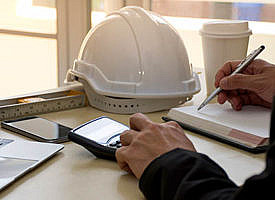As cryptocurrency-based investments grow in the public consciousness, blockchain is becoming an increasingly hot topic in many industries. Could this technology work for construction companies? It appears it could.
Defining blockchain
Although the technology behind blockchain is sophisticated, the concept is simple: It’s a shared database — or “digital ledger” — that’s continuously copied, updated and synchronized on thousands or even millions of computers maintained by various third parties.
This lack of centralized storage or control makes it extremely difficult for anyone to hack into or tamper with the database/ledger, which can accept new transactions only if they’re verified by these third parties through established consensus protocols. In simpler terms, blockchain allows users to securely share validated, immutable records.
Creating “smart contracts”
A blockchain logs transfers of records, but it also contains self-executing agreements that automatically occur when certain conditions are met. Does that sound like a contract? It could be. In construction, for example, a project-specific blockchain could be created and restricted to only certified contractors. This “smart contract” could be voided if specified time, progress or delivery requirements aren’t met.
Using a blockchain to create a construction contract would keep all parties on the same page. The technology eliminates confusion by maintaining only one version of the contract, which is virtually impossible to modify without triggering alarms. If a change or correction is needed, it can be added to the blockchain only after appropriate explanations and supporting documentation are submitted and approved, creating a permanent audit trail.
What’s more, there could be significant advantages to combining a subset of contractual details into the very currency used for payment. Consider a construction company’s vendor agreement for building supplies. The vendor could attach radio-frequency identification tags to materials as they’re shipped, allowing parties to track their movement.
Once the materials have been received, inspected and approved using a digital signature, the smart contract would determine whether the vendor has delivered the materials on time and met any other contractual terms. If so, the system would initiate an electronic payment to the vendor. If the vendor fails to meet contractual requirements, the smart contract would document this fact, alert the parties and could even track the delay’s impact on related construction activities.
Keeping tabs on the trend
Whether the construction industry will adopt blockchain-based contracts on a widespread basis remains to be seen. If several large and reputable infrastructure owners adopt a cryptocurrency to strengthen assurance of project progress, we could see a domino effect. Construction companies will be incentivized to accept the digital currency so they can win those jobs, and their subcontractors and suppliers will, in turn, also have a major incentive to use the digital currency. Whatever the future may hold, blockchain is an evolving technology trend well worth keeping tabs on.
© 2024




